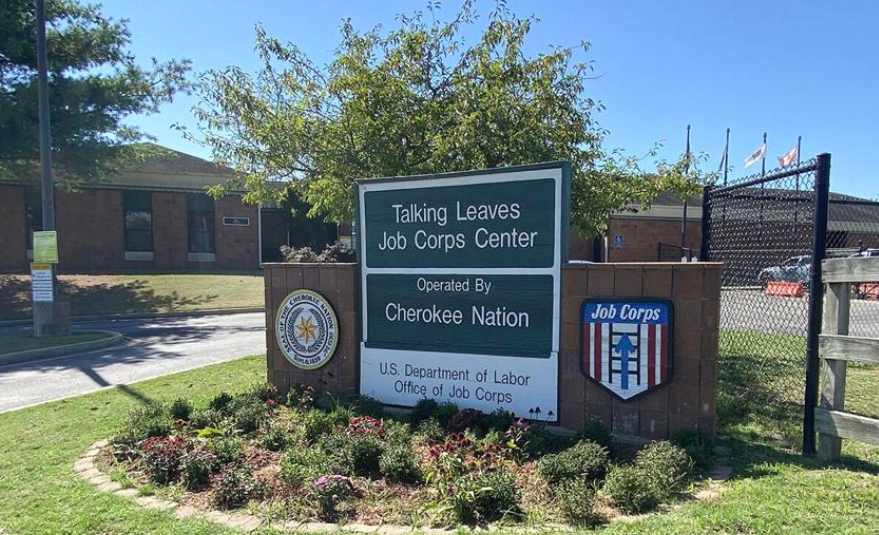
- Details
- By Chuck Hoskin Jr
Guest Opinion. For nearly half a century, the Talking Leaves Job Corps Center has stood as a beacon of opportunity within the Cherokee Nation. Nationally, the program has operated for six decades as a career lifeline for countless youth, including many who faced housing insecurity before joining the program. When traditional education and career pathways failed these young people, Job Corps has been there to open a better future.
That’s why I spoke out against the federal government’s attempt to terminate Job Corps, and I asked others to do the same. If allowed to proceed, the end of Jobs Corps would silence a tribal success story and strip away a vital resource that positively changes lives.
I am pleased to report that a federal judge has issued a restraining order that stops the U.S. Department of Labor from eliminating the Job Corps program until a further ruling on the case. This critical ruling halts the termination of contracts with Cherokee Nation and at all 120 Job Corps centers across the United States. The struggle for the future of Job Corps is not over, but this ruling should allow the federal executive administration, Congress, and stakeholders including Cherokee Nation to have rational and thoughtful conversations about how to improve the program without abruptly ending benefits for some of the most economically vulnerable students.

At Talking Leaves Job Corps Center, a program operated in Cherokee Nation’s capital city of Tahlequah since 1978, students between the ages of 16 and 24 learn essential career and life skills. We provide career training in high-demand fields — including clinical medical assistant, culinary arts, electrical wiring, facilities maintenance, certified nursing assistant, home health aide, and office administration — academic support and opportunities to earn high school diplomas; life skills training, including driver education; and a safe, supportive environment that honors Native culture and traditions.
Since the opening of Talking Leaves, we have graduated more than 7,000 students, many of whom have gone on to work at Cherokee Nation as valuable employees. Talking Leaves also has a decades-long working relationship with the U.S. military, sending hundreds of graduates into the various branches.
Talking Leaves is not just a training program; it is a safe haven and a community. Serving both Natives and non-Natives, this program has positively impacted youth throughout northeast Oklahoma. For decades, it has delivered an outsized return on investment by equipping at-risk youth with the skills needed to thrive in today’s workforce.
With this court action, we can now focus our efforts back on the education of 150 participants in our 24/7 residential campus in Tahlequah, instead of scrambling alongside students and parents to facilitate what was effectively an eviction of low-income students and the termination of their education program.
To our Job Corps students, their families, and Job Corps staff: We appreciate your patience during this uncertain time and are excited that you can continue your journey with us. We are relieved that the same is true for Job Corps students across the United States.
The Cherokee Nation remains a steadfast leader in preparing our citizens for success, no matter the federal government's decision. This is not just about saving a program or campus. It is about honoring our responsibility to ensure a better future for our youth. If job training programs are to be effective and innovative, the country can look to our tribe as a guide.
Job Corps changes many lives for the better, and Talking Leaves is the gold standard. We have proven time and again that Job Corps can work — and work well — when operated with dedication, cultural competence, and a strong commitment to student success. I want to assure you that Deputy Chief Bryan Warner, the Council of the Cherokee Nation and I will work diligently to protect and strengthen Job Corps for future generations.
While this court ruling is a significant victory, our work is not done. Learn more about the national Job Corps program and how you can support its future at https://savejobcorps.com/
Chuck Hoskin, Jr. is the principal chief of the Cherokee Nation.
More Stories Like This
The SAVE America Act Threatens Native Voting Rights — We Must Fight BackThe Presidential Election of 1789
Cherokee Nation: Telling the Full Story During Black History Month
Jesse Jackson Changed Politics for the Better
Native News Online at 15: Humble Beginnings, Unwavering Mission
Help us defend tribal sovereignty.
At Native News Online, our mission is rooted in telling the stories that strengthen sovereignty and uplift Indigenous voices — not just at year’s end, but every single day.
Because of your generosity last year, we were able to keep our reporters on the ground in tribal communities, at national gatherings and in the halls of Congress — covering the issues that matter most to Indian Country: sovereignty, culture, education, health and economic opportunity.
That support sustained us through a tough year in 2025. Now, as we look to the year ahead, we need your help right now to ensure warrior journalism remains strong — reporting that defends tribal sovereignty, amplifies Native truth, and holds power accountable.
 The stakes couldn't be higher. Your support keeps Native voices heard, Native stories told and Native sovereignty defended.
The stakes couldn't be higher. Your support keeps Native voices heard, Native stories told and Native sovereignty defended.
Stand with Warrior Journalism today.
Levi Rickert (Potawatomi), Editor & Publisher

